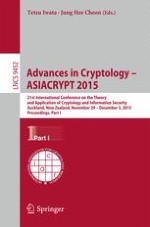2015 | OriginalPaper | Buchkapitel
Dual-System Simulation-Soundness with Applications to UC-PAKE and More
verfasst von : Charanjit S. Jutla, Arnab Roy
Erschienen in: Advances in Cryptology -- ASIACRYPT 2015
Verlag: Springer Berlin Heidelberg
Aktivieren Sie unsere intelligente Suche, um passende Fachinhalte oder Patente zu finden.
Wählen Sie Textabschnitte aus um mit Künstlicher Intelligenz passenden Patente zu finden. powered by
Markieren Sie Textabschnitte, um KI-gestützt weitere passende Inhalte zu finden. powered by
